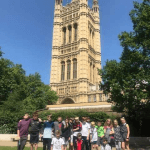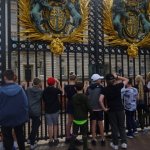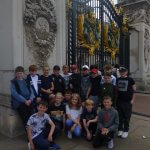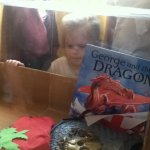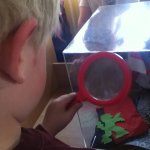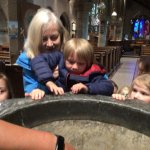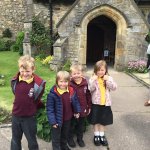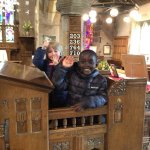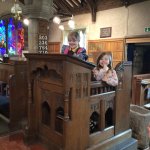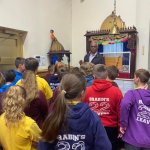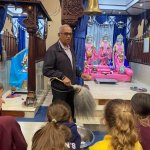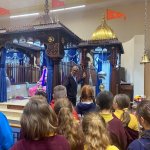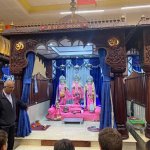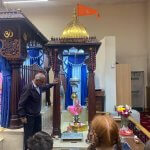Promoting British Values
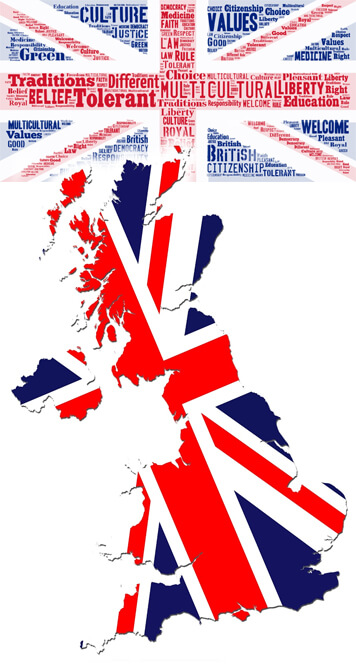
There has been great emphasis on the important role that British Values can play in education:
“To create and enforce a clear and rigorous expectation on all schools to promote the fundamental British values of democracy, the rule of law, individual liberty and mutual respect and tolerance of those with different faiths and beliefs.” DfE
The broad and balanced skills based curriculum offered at Brabin’s Endowed School, together with our Christian values, Brabin’s Entitlement Curriculum and SMSC provision equips our pupils to play a significant role in a diverse and rapidly changing world.
We believe that the acceptance of British Values is integral to life at Brabin’s Endowed School. Such values provide the basis with regard to the standard of behaviour expected by all. They also assist our community to make the best choice in any given situation.
At Brabin’s Endowed School, we will actively challenge pupils, staff or parents expressing opinions contrary to fundamental British Values, including ‘extremist’ views.
Value
|
How We Promote It
|
Democracy
Links to school values:
Respect Tolerance
Compassion
UN CRC Article 12: Children have the right to say what they think should happen, when adults are making decisions that affect them, and to have their opinions taken into account. |
- We have an active School Council, Fairtrade Steering Group, Tech Team and Eco Committee. These are used as an opportunity to promote and teach about democracy and the electoral process.
- We encourage volunteerism in and out of school. This includes things like the School Council, sports leaders, ICT support, reading partners, and also raising money for local and national charities.
- Pupils help to influence teaching and learning through Pupil Voice discussions.
- The beginnings of democracy are taught through historical research of the Ancient Greece civilisation.
- Democracy is also promoted through additional PSHE lessons and assemblies i.e. debating current issues such as Brexit, UKS2 visit to Parliament
|
The rule of law
Links to school values:
Respect
Responsibility
Justice
Honesty
UN CRC Article 19: Governments should ensure that children are properly cared for, and protect them from violence, abuse and neglect by their parents, or anyone else who looks after them. |
- We have high expectations about pupil conduct and this is reflected in our Behaviour Policy. There are rewards for exhibiting good and caring behaviour and consistent demonstration of our values is recognised through such things as ‘Star of the Week’ and the ‘Merit Award’.
- At the start of each academic year, each class develops their own class charter which they believe will make their class a happy and purposeful one.
- Visits from the Fire Brigade, NSPCC and Y6 ‘Safety Town’ days.
- Through our school assemblies, circle time and PSHE children are taught how to earn trust and respect and are supported to develop a strong sense of morality; knowing right from wrong and doing the right thing even when it’s difficult.
- The local police officer / PCSO visit the school to talk to the children and explain about their role in society.
- Children are taught about the United Nations Convention on the Rights of the Child and learn to respect their rights and the rights of others.
|
Individual liberty
Links to school values:
Respect
Courage
UN CRC Article 31: All children have a right to relax and play, and to join in a wide range of activities.
UN CRC Article 15: Children have the right to meet together and to join groups and organisations, as long as this does not stop other people from enjoying their rights. |
- Children are taught about the United Nations Convention on the Rights of the Child and learn to respect their rights and the rights of others.
- Through our school values and the PSHE programme, children are taught about personal responsibility, choices, ambition and aspiration. They are encouraged to take opportunities to follow their interests in art, music, sport etc.
- SEAL has specific units relating to individual liberty including ‘Good To Be Me!’
- Children are taught how to keep themselves safe, including on-line. This is done through computing lessons, assemblies and outside organisations such as the NSPCC, as well as through the PSHE curriculum and Online Safety lessons/UK Safer Internet themed days and weeks.
|
Mutual respect
Links to school values:
Respect
Friendship
Co-operation
Forgiveness
UN CRC Article 2: The Convention applies to everyone whatever their race, religion, abilities, whatever they think or say and whatever type of family they come from.
UN CRC Article 30: Children have a right to learn and use the language and customs of their families, whether these are shared by the majority of people in the country or not. |
- We have high expectations about pupil conduct and this is reflected in our Behaviour Policy.
- Children are taught about the United Nations Convention on the Rights of the Child and learn to respect their rights and the rights of others.
- Through our school’s values, SEAL scheme, PSHE and circle time children are taught to respect each other, to be cooperative and collaborative, be supportive and to look for similarities while being understanding of differences.
- The SEAL theme of ‘Getting on and Falling Out’ explores these issues well.
- Mutual respect is also promoted through additional PSHE lessons and assemblies. A range of specific assemblies were delivered focusing on helping other pupils to understand specific special needs.
|
Tolerance of different faiths and beliefs
Links to school values: Respect Tolerance/Understanding
UN CRC Article 14: Children have the right to think and believe what they want, and to practise their religion, as long as they are not stopping other people from enjoying their rights. Parents should guide their children on these matters. |
- We have high expectations about pupil conduct and this is reflected in our Policy.
- Tolerance of different faiths and beliefs is promoted through the Syllabus for Religious Education. Children learn about different religions, their beliefs, places of worship and festivals. The children’s work on this subject or whole school learning in assemblies is often displayed in the classrooms or around the school.
- This is supplemented by assemblies (Key Stage and whole school), which also mark and celebrate significant religious festivals such as Ramadan and Diwali.
- Visits are made by local religious leaders and children have the opportunity to visit different places of worship.
- Children are taught about the United Nations Convention on the Rights of the Child and learn to respect their rights and the rights of others.
|
Click below to download our British Values statement
Promoting-British-Values
23rd April 2021 – St George’s day
In Reception, the children were really keen to look at what was in our curiosity cube this week. They used magnifying glasses to look closely at the different objects such as a flag and dressing up clothes. On Friday 23rd April the children shared their ideas and predictions about what was in the curiosity cube and we had an assembly all about this day.
Queen’s Platinum Jubilee – May 2022
The children enjoyed the celebrations including a whole school tea party and they cam to school dressed in red, white and blue. During the day the children took part in a range of activities including learning the national anthem to sing at the tea party, drawing a portrait of the Queen, finding out about countries in the commonwealth and learning about the family history of the monarchy.
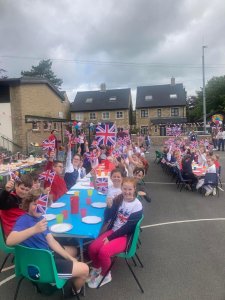
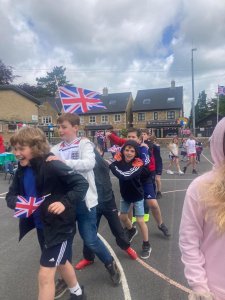
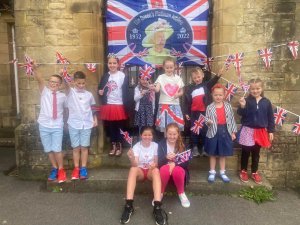
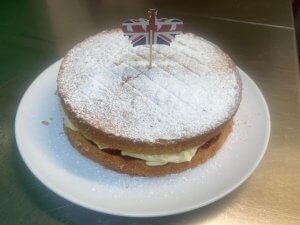

Reception visit to St Bartholomew’s church May 2022
Year 5/6 – Visit to a Hindu temple June 2022






